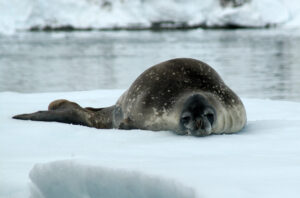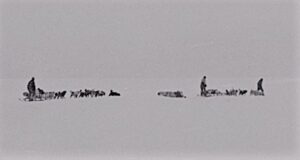Archive for December, 2020
» posted on Thursday, December 31st, 2020 by Linda Lou Burton
I Haven’t Had a Bean in Weeks
Originally posted December 31, 2005 by Linda Lou Burton from Lima, Peru – Seating roulette. Interesting how it’s played. Boarding in Santiago, expecting the window seat this time for sure, I found myself once again in the center, but on the aisle. Ah, no one in the center seat. Could I be so lucky as to have a little room? First switcheroo – girlfriend moved from elsewhere to sit by guyfriend, assigned the other aisle seat. Center seat, now taken. I clamped my elbows closely to my side. Anything sticking into the aisle would get chopped off at the nub, for sure.
Across the aisle from me, two newly-marrieds, doing the Versace stroke. They had a window view, but they pulled down the shade. Behind them, two empty seats. I waited, pounce ready. Before I could blink, a little girl moved from behind me and stretched out in those two seats, ready to sleep. Her window shade also was closed.
Oh well I’ll entertain myself with the GPS map, I thought. Alas, no such feature on this plane. No screen, no games, no room, no air. For five cents I would be miserable. But it’s almost the New Year. We’ll celebrate! Every time zone! Yea! Airbound at last.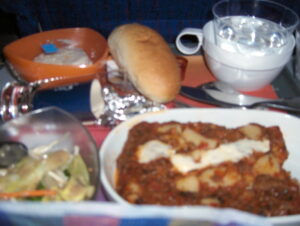
Dinner was served. Gunky pasta with meat sauce, salad, roll, a bit of orange-flecked cake. The couple to my right indulged in intimate whisper-talk. I interrupted long enough to say “Our New Year’s dinner, eh?” They laughed. Salt Lake City, they’re headed there, they said. Dinner over, I struggled down the aisle to pee.
No sleep before our Lima stop. Then on the ground, a flood of newbies filled the plane; bags banged against my shoulder, klump, kalump, kalump. Evicted from her comfy seats, the sleeping girl was yanked across the aisle by father’s hand. Too many people now, too little space. I sucked in air, hoarding breath, grasping for some calm. Think of something else, I told myself.
Lee-ma, Peru. Ly-ma bean. Lee-ma. Ly-ma. Nothing could be fine-a. Good grief, I thought, as I scanned Nordnorge’s smorgasbord in my memory bank. I saw salads, seafood, myriad desserts. But no beans, anywhere.
No wonder I’m getting cranky. I haven’t had a bean in weeks.
» posted on Thursday, December 31st, 2020 by Linda Lou Burton
Play it again, Sam
 Originally posted December 31, 2005 by Linda Lou Burton from Santiago, Chile – Time to move on; leave the comfort of our beautiful hotel; board the the 3 PM shuttle bus to the international airport. Maria was with us again! She had a family barbecue planned for the evening, she said, to bring in the New Year. But she was good-natured, as ever, her gentle melody-voice explaining the four stops we would have to make inside the terminal. One, check our bags and get our boarding pass. Two, go to Counter 54 and pay the exit fee of $18. Three, go through the security line. Four, turn in the declaration form. Check the bags? Oh no, I have to deal with BAGS again. Didn’t my tour information say “Baggage transfers included”? What did that mean?
Originally posted December 31, 2005 by Linda Lou Burton from Santiago, Chile – Time to move on; leave the comfort of our beautiful hotel; board the the 3 PM shuttle bus to the international airport. Maria was with us again! She had a family barbecue planned for the evening, she said, to bring in the New Year. But she was good-natured, as ever, her gentle melody-voice explaining the four stops we would have to make inside the terminal. One, check our bags and get our boarding pass. Two, go to Counter 54 and pay the exit fee of $18. Three, go through the security line. Four, turn in the declaration form. Check the bags? Oh no, I have to deal with BAGS again. Didn’t my tour information say “Baggage transfers included”? What did that mean?
The international airport was a good distance from the city, a pleasant freeway ride, with stands of pink-tasseled mimosa trees and glossy-leafed magnolias along the way. My Myrtle Beach seatmate and I agreed, it looked like South Carolina. Now, the terminal. Maria and our driver scurried to grab carts, piled the luggage on. Ah, that’s what it means, I thought. Maria helped me push my cart till I reached the line, got into the serpentine maze, then off she went to a special counter with Ross, who’d lost his passport. “Maybe he can just show them that Antarctic pebble he has,” I thought wickedly to myself. “Or the knife he says he won’t take out of his pocket no matter what security tells him.”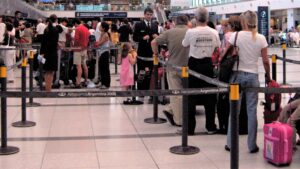
My wait began. I made seven serpentine turns before arriving at the check-in counter. But I was cool, full of Buenos Airesian hospitality, ready for anything. Others were not. “Stop fidgeting!” said a mother to her little boy. “Tuck your shirt in!” she said to another child. “Tie your shoes!” she said to a third. Their cart was piled high with enormous bags, the children were leaning, pushing, laying on the floor. “How much longer will it be?” said one of my South Carolina tour mates just behind. “I don’t know,” answered the other. That question, and that answer, repeated on a five-minute track, again and again and again. A Lan Chile employee, gorgeous, sleek and smiling, walked the line, threading plastic locks through every zipper on every piece of luggage. “We want your bags to be safe,” she explained to each of us. “We can’t lock our bags in the US,” I commented. “I know,” she answered, “but we don’t think it’s a good idea to have unlocked bags.” I thanked her profusely.
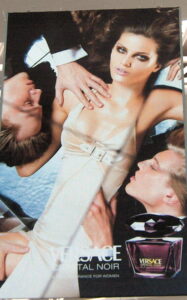 Overhead, a fright. A Versace perfume ad postered a 40-foot woman in a state of swoon, eyes glazed, in a hands-on ceremony of multiple caressments by several other glazey-eyed swooners. Powerful stuff, Versace. More raunchy than Manuel’s penguins mating. Cover the children’s eyes! Cover mine! It made me chuckle.
Overhead, a fright. A Versace perfume ad postered a 40-foot woman in a state of swoon, eyes glazed, in a hands-on ceremony of multiple caressments by several other glazey-eyed swooners. Powerful stuff, Versace. More raunchy than Manuel’s penguins mating. Cover the children’s eyes! Cover mine! It made me chuckle.
Finally I’m up to bat, I swung my fancy-schmancy bags from cart to counter. In no time I had my seat assignment, my gate number, and a smiling wish for a “good trip.” Next to Counter 54, past the blue sign, Maria had said. I saw blue signs ahead, picked the wrong one, backtracked, handed over a US $20. Change back, it was $18 to leave Argentina. Security next. No problem there, except for lack of air. (Why do they call them AIR-ports? Most rooms are incredibly stuffy.) Oops, geez, what was the fourth stop? I couldn’t remember anything else. But there was a gate to stop me again. Hmmmm. Oh, the declaration form! I grabbed one from the counter, checked the boxes, in like flinn, it’s OK, I’m done!
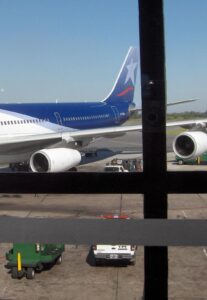 The waiting area by the gate was pleasant, not too crowded, I picked a seat where I could see the plane. Eek! A fright again. The Versace woman was there too, swooning above me, I moved. A tiny snack bar ahead. Aha, I remembered this time. Buy a bottle of water. I approached, asked. My God! Embarrassed. After two weeks I still don’t know the Spanish word for water. The clerk did not speak English. I pointed. She asked a question I did not understand. We leaned closer to one another, neither understanding. Finally she handed me a bottle, told me the price. I began laying money on the counter, but it was not enough. She was frowning at me. I should know how to trade by now. Still embarrassed, I vowed to better prepare for my next trip. An American sitting at the counter finally told me what to do. “Thanks,” I said to him, clutching my precious bottle of water. I slunk back to my seat, away from the scary Versace woman, away from the South Carolina travelers who were now in full-quarrel mode.
The waiting area by the gate was pleasant, not too crowded, I picked a seat where I could see the plane. Eek! A fright again. The Versace woman was there too, swooning above me, I moved. A tiny snack bar ahead. Aha, I remembered this time. Buy a bottle of water. I approached, asked. My God! Embarrassed. After two weeks I still don’t know the Spanish word for water. The clerk did not speak English. I pointed. She asked a question I did not understand. We leaned closer to one another, neither understanding. Finally she handed me a bottle, told me the price. I began laying money on the counter, but it was not enough. She was frowning at me. I should know how to trade by now. Still embarrassed, I vowed to better prepare for my next trip. An American sitting at the counter finally told me what to do. “Thanks,” I said to him, clutching my precious bottle of water. I slunk back to my seat, away from the scary Versace woman, away from the South Carolina travelers who were now in full-quarrel mode.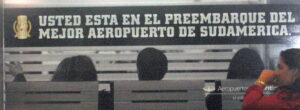
On board! And now I see, my boarding pass gave me an aisle seat, not the window I requested. But, ahhh, looky here. Must be a movie star, surely. A young man, handsome, slender, tight jeaned, day-old beard; he nodded, sat, whipped out his cell phone, made a call, low-voiced. “Do you want me to come and run naked on the beach with you?” he almost whispered to the phone. I was reminded of a song, “Hello young lovers, wherever you are”; if you don’t know it, look it up. Shades of Versace.
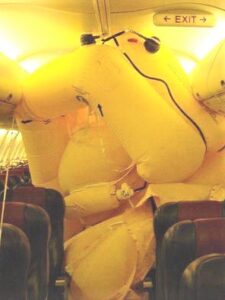 Buenos Aires to Santiago, that was the first leg of the flight. My Argentinian cowboy-movie star and I waited as others exited, a long, slow process; laughing at the image of what would happen in an emergency. “The disaster instructions show everyone quietly reaching under their seat for their life jacket,” he said. “Yes, and they don’t tell you NOT to pull the cord till they get to the end of the instructions!” I added. “I can see all of the life jackets going whoosh whoosh whoosh inflating before they remember.” We laughed harder. “And exiting the plane!” he said, “you know people would be fighting each other to get out first!” “Right,” I laughed, “pushing and shoving and stepping on each other.” We shook our heads at the thought of it, sniffle-laughing till it was time to go. He was headed for Mendoza.
Buenos Aires to Santiago, that was the first leg of the flight. My Argentinian cowboy-movie star and I waited as others exited, a long, slow process; laughing at the image of what would happen in an emergency. “The disaster instructions show everyone quietly reaching under their seat for their life jacket,” he said. “Yes, and they don’t tell you NOT to pull the cord till they get to the end of the instructions!” I added. “I can see all of the life jackets going whoosh whoosh whoosh inflating before they remember.” We laughed harder. “And exiting the plane!” he said, “you know people would be fighting each other to get out first!” “Right,” I laughed, “pushing and shoving and stepping on each other.” We shook our heads at the thought of it, sniffle-laughing till it was time to go. He was headed for Mendoza.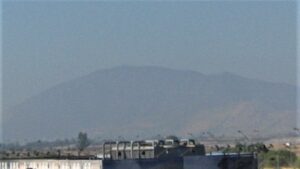
I exited the plane expecting to spend a few minutes in the waiting area while they spiffed things up for my reboard. But no! We were pinned like cattle in a hot and stuffy glass-walled passage. What was happening? Outside, I saw the familiar brown-hazed hills of Santiago. The crew exited the plane, pushed their way around us. “Why are we waiting here?” I asked one of the flight attendants. “I don’t know.” She shrugged her shoulders and kept walking. An American family waited in line in front of me, Mom and Dad, two teen sons, a daughter, maybe 12. She was cute in flippy short shirt and flip-flop sandals, fingers and toes glossed in Barbie pink. The boys were studying plane activity outside, theorizing our delay. The father  was scowling at the crew, as they walked away. The mother began to rattle questions in Spanish; one attendant turned around, answered. I decided to hang close, a language-bridge here, aha! The mother turned back to her family, explained there was a change of planes, we were to go to Gate 17. “For Lima?” I was quick to ask. “For LA?” “Yes,” she nodded, that’s where we’re going.” Well, I thought, at least I have a clue. I stood near the daughter, hoping I’d blend into the family circle. I could be the grandma! I asked her where they’d been, she named the cities, a Christmas holiday in Argentina. We talked about penguins, horses, sheep, the ranches, the barbecues. “I can’t eat lamb!” she said, “cute babies, oh no!” She showed me her fuzzy lamb souvenir.
was scowling at the crew, as they walked away. The mother began to rattle questions in Spanish; one attendant turned around, answered. I decided to hang close, a language-bridge here, aha! The mother turned back to her family, explained there was a change of planes, we were to go to Gate 17. “For Lima?” I was quick to ask. “For LA?” “Yes,” she nodded, that’s where we’re going.” Well, I thought, at least I have a clue. I stood near the daughter, hoping I’d blend into the family circle. I could be the grandma! I asked her where they’d been, she named the cities, a Christmas holiday in Argentina. We talked about penguins, horses, sheep, the ranches, the barbecues. “I can’t eat lamb!” she said, “cute babies, oh no!” She showed me her fuzzy lamb souvenir.
Finally the line began to move, around a corner, we turned, we’re in an x-ray room! Security, again. What the &%$#*(&)(*&? How many of us have had a chance to purchase bombs and guns since the security check that put us ON the plane? I’ve never been x-rayed getting OFF a plane. But, there it was. Then, worse. My pack was stopped, pushed to the side, I’m signaled over. “Senora, I need you to open your pack,” the attendant said.  I smiled, complied, unzipped the top. She pointed to an object, queried, “What is that?” I reached for my laser-thermometer, quickly picked it up. She jumped back a step; I slowed my movements down. “It’s my thermometer,” I said clearly. “Would you like me to show you how it works?” I realized she could see its push-button — could it be a detonator? I didn’t dare to laugh. She studied the object in my hand, I forged ahead and pushed the button. “78” registered on the face panel. “See,” I said, “it shows the temperature in this room.” She nodded, smiled at me. “That’s fine,” she said, “that’s all I need to see.” I was dismissed.
I smiled, complied, unzipped the top. She pointed to an object, queried, “What is that?” I reached for my laser-thermometer, quickly picked it up. She jumped back a step; I slowed my movements down. “It’s my thermometer,” I said clearly. “Would you like me to show you how it works?” I realized she could see its push-button — could it be a detonator? I didn’t dare to laugh. She studied the object in my hand, I forged ahead and pushed the button. “78” registered on the face panel. “See,” I said, “it shows the temperature in this room.” She nodded, smiled at me. “That’s fine,” she said, “that’s all I need to see.” I was dismissed.
I hurried out the door, but my language-bridge family was nowhere in sight. A marker overhead said Gate 13. I ran, chest tightening with every step, towards Gate 17. I had no idea when my plane was due to leave. I could not bear to miss another flight. Puff puff pant pant Gate 17. There, a flight prepared to leave for Canada. My heart sank. And then, I gained my senses back. “You don’t need no stinking translator,” I thought to myself. “Just read the Departure Board.”
“Lima,” it said. “Gate 21. 7:30. On time.” Well rats and hallelujah. I had been fretting and rushing for nothing. I had plenty of time. I ambled down the walkway, thinking about the cup of coffee I’d buy at the Dunkin Donuts spot I remembered from my pass-through two weeks earlier. Ah, just ahead I saw my adopted granddaughter in the flippy skirt, waving at me. I might have a donut too, I thought as I reached for my change purse. After all, it was New Year’s Eve. A quick left to the donut counter. It was closed.
No coffee. No donut to dunk. But I had my bottle of water. And I had my gate. And I had time to spare. My Barbie friend came over to chat, while we waited for airport things to happen, in their own good time.
» posted on Thursday, December 31st, 2020 by Linda Lou Burton
Don’t Cry for Me
Originally posted December 31, 2005 by Linda Lou Burton from Buenos Aires, Argentina – The year was winding down. The trip was winding down. And I was winding down too. Breakfast at 7 in 214, part of the tour stuff, Antarctic adventurers sitting together one more time over eggs and toast. Unassigned table, suddenly I’m with a bunch of Americans, most I hadn’t encountered on the ship. South Carolina, Myrtle Beach, Clemson; Connecticut; New Hampshire; we met in Buenos Aires!
Downstairs, the City Tour at 8. Maria. Maria, blond, slender, people-savvy. Maria knew her city, Maria knew her facts. She told her story golden voiced, syllables stretched slowly into bells, a lovely melody. First corner, a pause. The Opera House. Teatro Colon. Colon Theatre. Known worldwide for its excellent acoustics. One of the world’s premier opera houses. Maria Callas, Toscanini, Stravinsky, Caruso.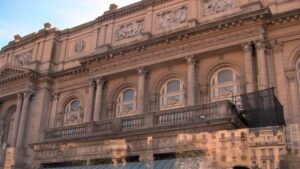
We drove on. I snapped my pictures through tour-bus windows. Time, too short. Maria told grand stories about the city, melody creating mood, as we moved through the Centro district, San Telmo, Montserrat, Palermo, La Boca, Puerto Madero. First stop, Recoleta Cemetery. One of the most famous cemeteries in the world. Founded in 1822. Six hectares in size. Famous sculptures, crypts, graves where famous people rest. Historic monuments. Important mausoleums, such as Evita’s, other national heroes, writers, Argentine Presidents.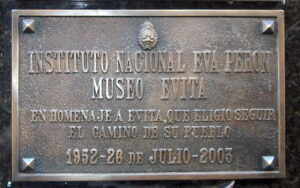
The bus pulled to the edge of the brick-walled haven of quiet and Maria began her story. Eva Duarte, who married Presidente Peron, a woman of the people, then first lady of the land. Evita! “We’re going to walk around inside,” Maria told us, “and though we believe it is safe in our city, I ask that you leave all jewelry and valuables in the bus.” Since I had only two small cameras — one for each zip-up pocket — I was good to go. We had 20 minutes inside the walled cemetery.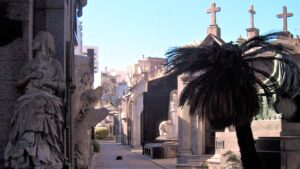
Cats wandered lazily, or curled in a spot of sun. Lives to spare? Maria told more stories. Tour mates darted into walkways for the perfect shot — the angle of an angel’s wing; a name carved in marble, long ago. Long forgotten? A man with a cane, walking alone. Trees shaded the peaceful sighs of the dead, resting now. 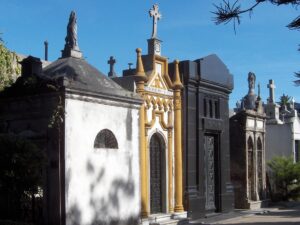
Maria disappeared. I could hear no voices, do I go right, or left? I saw the church ahead, hurried to catch up. The Nordnorge sign, lifted high, passing through the gate. Across the street purple flowers beckoned to my camera. Maria and the bus beckoned too. Hurry. I jumped aboard, snapped McDonald’s on the corner as we drove away, on fast-food time.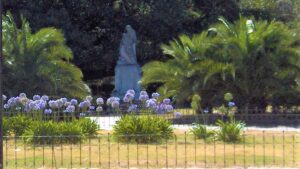
Second stop, Plaza de Mayo. The city center. Site of Argentina’s most important historical events. Surrounded by Government House, Metropolitan Cathedral, Town Hall, Bank of Argentina. Maria’s history lesson flowed through the bus as we made each turn around the square.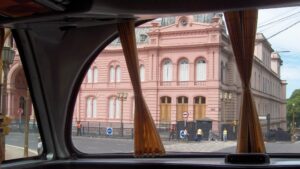
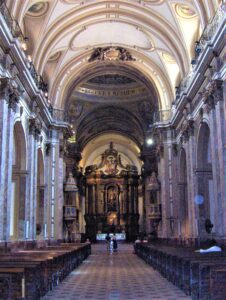 The driver eased the bus to the curb in front of the Cathedral. “Twenty minutes,” Maria said, before she allowed us out the door. “Be back here in 20 minutes.” I stepped into the heat, surrounded by tour buses, radio taxis, tourists, beggars, vendors, orange-vested policio; jumbled real-time and past-time meeting on the square, under a last-day-of-the-year blue sky. Will I be a part of Plaza history now, or will it be a part of me?
The driver eased the bus to the curb in front of the Cathedral. “Twenty minutes,” Maria said, before she allowed us out the door. “Be back here in 20 minutes.” I stepped into the heat, surrounded by tour buses, radio taxis, tourists, beggars, vendors, orange-vested policio; jumbled real-time and past-time meeting on the square, under a last-day-of-the-year blue sky. Will I be a part of Plaza history now, or will it be a part of me?
The Cathedral portico was lined with beggars; women crouched as crippled; children brushed the arms of passers-by, pleaded. I had nothing in my pocket but cameras. Inside, I offered prayers. The church was huge, ornate, saints and sinners mingled under gold and blue, death and life. Symbols. Faith. And hope. I prayed for children everywhere.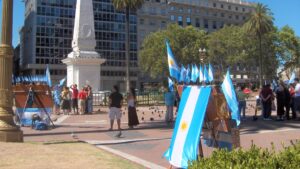
The sidewalk now, vendors hawking Argentinian leather purses, jewelry, t-shirts, flags. Wait patiently for the light to change. Across the street, the Plaza. No demonstration today. But the black fence was there, stay back, stay back, stay this far from Government House. Today it had no use. The Policio were chatting, enjoying the sun.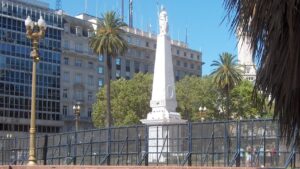
Tour buses made the turn only a sidewalk-width from the pink walls of Government House. I walked to the front for pictures, stood under the palm trees, saw two guards standing at attention beside the door. I could never get this close to the Capitol in Washington DC. What does this mean, as I stand in the heart of the fourth-largest city in the world? What does it mean about my country?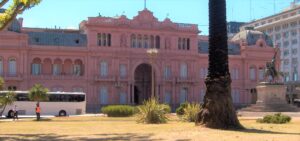
My twenty minutes were gone. Children and pigeons played in the sunshine of the Plaza, while grown-ups rested on nearby benches, a summer holiday. The blue flag of Argentina decorated the vendor’s stands, hand-sized versions for sale. But I had no money in my pocket, I had to hurry, run, hobble-run through the crowd, waving, waving at Maria, who stood by the door of the bus, ready to move on.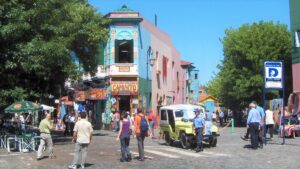
Third stop, La Boca. Little Italy. Mediterranean style. Brightly painted wood and corrugated tin houses inhabited by families, artists, musicians. One of the most picturesque places in the city due to its colorful port setting, said the brochure. A working class neighborhood located at the mouth of the river (La Boca means The Mouth). Main street is Caminito.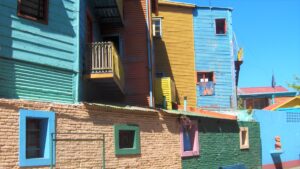
We knew before she said it. “The bus will stop for 20 minutes.” I was out in a flash. The street was only two blocks long, but I wanted to absorb the color, the noise, the feel of the place. I walked rapidly to the turn-around spot where I saw boats and river, timing the time I had to leisurely stroll the cobble streets back to the bus.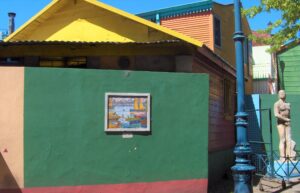
Blue. Pink. Yellow. Green. Color everywhere, on everything, unexpected curves and angles, a painting hung below a window on a wall of brilliant blue, a wood-carved head jutting from a ledge, flowers, cats, voices, music, caricatures, exaggerated smiles, stick-your-head-in-the-hole-and-get-your-picture-made, postcards for sale, trinkets, souvenirs. A playful place.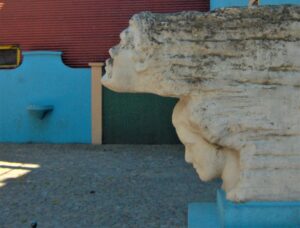
Back at the bus, Maria was not there, the driver was not there, the door was closed. We gathered, watched a dog lazing in the door of a shop, knowing this was almost the last thing we’d do together. We did not mind Maria’s tardiness. Here there were trees, a life-sized papier-mache cow to keep us company. Ross confessed, he took a pebble from the shore on one of our Antarctic stops. Mary fussed, told him he is a lout. Maria arrived, and we were on our way. Did Ross understand?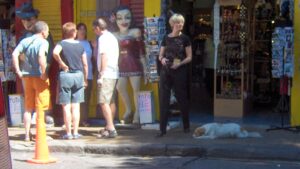
Time was almost up. The bus followed the river, Puerto Madera now, renovation, beautiful new buildings along the water. Offices below, condominiums above, expensive, glitzy, gorgeous; finest restaurants in town here now. The tires of the bus were almost squealing as we hurried back, moving fast, there were planes to catch. Back at the hotel, I packed my bags and turned them over to the concierge to wait for our 3 o’clock airport shuttle. Noon checkout was required.
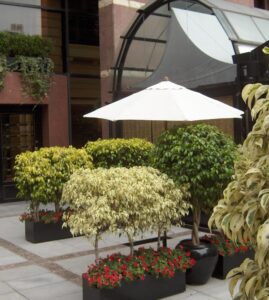 Needed lunch. Mostly, needed something COLD to drink. It was hot and humid in the lobby, although the hotel staff were dressed in fancy-dancy suits and ties. I checked the temp with the laser-thermometer I keep in my pack. 84 degrees. Meltdown. I headed for the beautiful terrace restaurant at the back of the hotel lobby. Locked! The bar was not an option, cigarette smoke swirled in blue clouds around the plush and comfy chairs. Grrrr. I walked to the back patio, checked the restaurant’s outside door. Locked. I shook and rattled the door, it was after noon and the sign said Open 11 AM. It opened. “May I help you, Senora?” “I’m looking for lunch!” I replied, gruffly. “Then please to come in,” he smiled. I walked inside. It was hotter, muggier, steamier, than the lobby. “Don’t you have air conditioning?” I asked with attitude. “Why is it so hot?”
Needed lunch. Mostly, needed something COLD to drink. It was hot and humid in the lobby, although the hotel staff were dressed in fancy-dancy suits and ties. I checked the temp with the laser-thermometer I keep in my pack. 84 degrees. Meltdown. I headed for the beautiful terrace restaurant at the back of the hotel lobby. Locked! The bar was not an option, cigarette smoke swirled in blue clouds around the plush and comfy chairs. Grrrr. I walked to the back patio, checked the restaurant’s outside door. Locked. I shook and rattled the door, it was after noon and the sign said Open 11 AM. It opened. “May I help you, Senora?” “I’m looking for lunch!” I replied, gruffly. “Then please to come in,” he smiled. I walked inside. It was hotter, muggier, steamier, than the lobby. “Don’t you have air conditioning?” I asked with attitude. “Why is it so hot?”
“We have the glass roof, so we cannot stop the sun come in,” he said, “but we have the fan so you can sit under,” he gestured to a table directly beneath a slowly whirling fan. The room was beautiful, filled with palm trees, climbing vines, orchids, even the song of birds, a tropical jungle-haven. Just ahead the luncheon buffet was spread, the display itself nothing less than a work of art. The table legs were different heights, each course set up at different levels to catch the eye; the plates were huge, and square, perfect for a buffet gorge. I walked around the multi-layered food, entranced. “I guess I’ll stay,” I mumbled. “But only if you have ice.”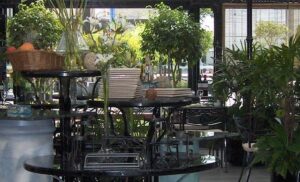
“Si, Senora,” he said, pulling out my chair. He brought a bottled Coke, cold from the cooler. He brought a tall sipping-glass. He brought an entire bucket of ice. “Please to help yourself, Senora,” he said, when he saw I had begun to cool down. “Is all for you.” He gestured to the food display. It was true, there were no other customers in the room, and the fabulous assortment of meats, fish, salads, vegetables, desserts, and breads was, in theory, mine.
This was the first moment since my trip began that I’d had so much privacy, so much personal attention, so little need to hurry. I suddenly felt queenly, rested, back on top of my game.
Don’t cry for me, Argentina. I will remember you well.
» posted on Wednesday, December 30th, 2020 by Linda Lou Burton
Some Like It Hot
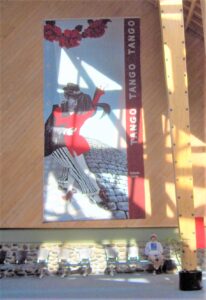 Originally posted December 30, 2005 by Linda Lou Burton from Buenos Aires, Argentina – In Argentina, they say tango isn’t dance, it’s attitude. I left Ushuaia with the lobby’s sky-high TANGO poster in my mind, thinking of the ticket in my pocket for the evening tango show, with dinner. Buenos Aires, I chuckled to myself. The Paris of the South. Hot and steamy, Buenos Aires. Argentine scene. Hmmm, what scene would be mine?
Originally posted December 30, 2005 by Linda Lou Burton from Buenos Aires, Argentina – In Argentina, they say tango isn’t dance, it’s attitude. I left Ushuaia with the lobby’s sky-high TANGO poster in my mind, thinking of the ticket in my pocket for the evening tango show, with dinner. Buenos Aires, I chuckled to myself. The Paris of the South. Hot and steamy, Buenos Aires. Argentine scene. Hmmm, what scene would be mine?
The plane was not jam-packed, and even though it was open seating up for grabs, I wound up with a window seat. Good luck. They served us food, right away, some chicken chunks, hot, and a dab of stuff best named Rice With Three Peas. But lunch it was, with cream-cheese cake, and I even caught a nap.
Three hours to fly, and then below there was a city, stretched far beyond my range to see. Buildings. Tall. Stacked and stacked and stacked. Like some can’t-quit kid let loose with jumbo Legos, Christmas morn. I pressed my face against the window, excited now. Swimming pools! Freeways! 14 million people, living, working, driving, sleeping, down below. We’re on the ground.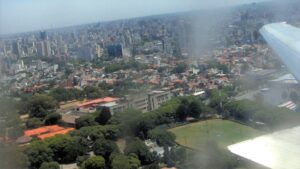
“Luggage transfers included.” That’s what the tour description said. I’d put fancy-schmancy outside my cabin door the night before, purple-ribboned, hadn’t seen them since. I looked forward to ambling through the airport now, fancy-schmancy mysteriously appearing in my hotel room. There was a bus when we deplaned, doors opened, hop on in. Quick ride, and suddenly we’re stopped. The BAGGAGE carousel! Ee-yikes, my tour-buddies, standing, fussing, watching over circling bags. We’re sweaty, cranky, pushy, mean. Free carts, at least.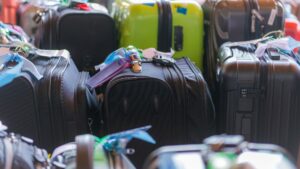
Grab our luggage, wheel it through a door. THERE the help; there a sign: NORDNORGE ENGLISH; and then a split. SHERATON. INTERCONTINENTAL. Two piles of bags and strong-armed men. I pushed my way to INTERCONTINENTAL and dumped fancy-schmancy onto the pile. It was hot and steamy in the room, hard to breathe. I needed air. I needed water in and water out.
A woman held a sign above her head, began to move. NORDNORGE. INTERCONTINENTAL. Tall and lanky, her walk was not in steps, but rolling waves, the sign waved up, the sign waved down, her stride a tango, hot and fluid, dancing through the crowd, Pied Piper to a gang of addled rats. I ran to catch her, tapped her shoulder, “Restroom, please?” I begged. “Toilette,” she replied. “Soon.” Her dance continued, finally to the door. “Toilette,” she pointed left, with a smile. But right she turned, started out the door. “Please wait for me!” I shouted, running left. “Closed for cleaning,” said the toilette sign. Quick! Outside! A bus, NORDNORGE. INTERCONTINENTAL. I jumped on board.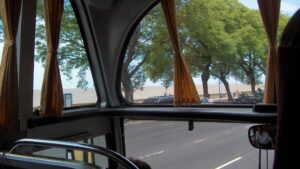
She read her list, she counted heads. And then the bus moved out, towards Rio de la Plata, brown water at the city’s edge, not ocean, river, flowing south, unless the tide prevents. Her voice was like her walk, flowing, sexy, attention called to everything around. Neighborhoods named, each section of each word pulled into taffy, sweettreats for the ear. Pa-ler-mo. Re-co-le-ta. I was charmed, lured, slowed my thinking to the cadence of her voice, forgot my needs. Buenos Aires! A city lesson on the way, my camera snapped through pleated tour-bus curtain-drape. Wide tree-lined streets, the theme. An overview of sights to see.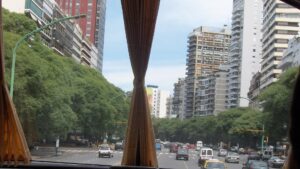
Hotel, at last. Confusion, once again. “Go to floor Minus One,” she said, “for checking in. Tour operators there will help you.” Elevator down. Elevator stopped. No sign. An employee, helpful, pushed the lobby button, up. “Check een!” he said smiling, nodding at my wheelie bag. “No! Tour!” I said, “MINUS ONE.” We played the game, push the button, smile, I’m-helping-you (No-you’re not), up and down. I gave up at lobby level, sat in a chair, eyed the too-long counter-line. A tour-mate saw me sitting there. “Our tour check-in is Room 214,” he said. “There was a mix-up.” “Thanks,” I sighed.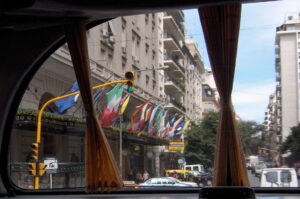
Two rooms for the tour-gang. Set with cookies, water, juice, and tea! My friends, again, smiling now, another hurdle passed. I downed a glass of cooling water, sat. The other room, a table, lists. My name! My room key! An information pack! “Anything you need, we’re here to help.” A smile. “My luggage?” Downstairs, call the concierge. I headed for my room, slipped the plastic through the slot, I’m in! My bed, my chair, my bathroom. Time, and space, ahhhhhhhhhhh, relief is sweet.
Later. Ready for the tango show. My dressing plan revised. The sparkly long-sleeved sweater bought in northern clime? Tossed on the bed. Too hot! Short sleeves here, cotton, my drapy stole that’s edged in fringe. Long skirt, split halfway up the front. A tango girl am I, version 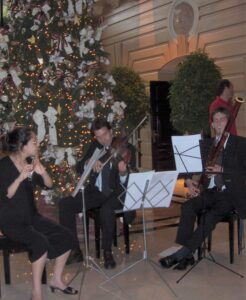 Granmama. The flaw. No pockets, where to put my cameras? My pack’s too big to take. Aha! Cosmetics bag! I dumped the contents, stuck the hand-sized cameras in, added lipstick too. In this town, lips are RED. Ticket? Check. Let’s go.
Granmama. The flaw. No pockets, where to put my cameras? My pack’s too big to take. Aha! Cosmetics bag! I dumped the contents, stuck the hand-sized cameras in, added lipstick too. In this town, lips are RED. Ticket? Check. Let’s go.
Downstairs, to wander before the time to leave. Christmas everywhere, fake firs decked in red, with lights, so weird to me, in the summer heat. But pretty, yes. Classic music in the center lobby, a trio dressed in black and white; canned rock and roll thumping on the terrace at the back. Friends here and there, to stop and chat.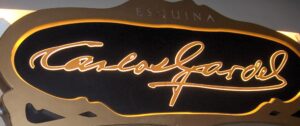
We’re on our way. Another bus. Speeding through the city streets, we’re laughing now, alert and primed for play. Esquina Carlos Gardel, the tourist tango show, we’re there. We crowd the door, surge in, it’s noisey, hurried, come sit down, it’s time to eat! Wait staff descend, the wine is poured, the menus read, the orders placed. The food arrives, we eat, we laugh, we talk. Dessert is sherbet, lemon, dunked in vodka, oo-la-la. The lights go down, the curtain up, the show begins.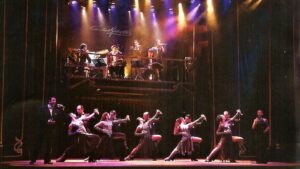
Tango. From the program, each act, each dance. El Choclo. Corazon de Oro (La Compania). Celos (Victoria y Sebastian). Arraballero (Carla y Carlos). Mi Buenos Aires Querido (Rafael). Volver. Milonga Vieja Milonga (Ines y Mauricio). Boedo (Magdalena y Facundo). Garua. Mala Junta (Silvia y Guillermo). Milongueando En El 40′(Sabrina y Ruben). Nocturna. Gallo Ciego. La Maffia. Rubias de New York. Mi Amigo El Cholo. En Esta Noche Gris (Claudia). A Los Amigos. A Don Evaristo Carriego. Verano Porteno. Yira Yira (Rafael, Nestor y Jorge). El Dia Que Me Quieras. Chique. Libertango. La Cumparsita. Adios Nonino (Erica). La Evasion. La Cumparsita (La Compania).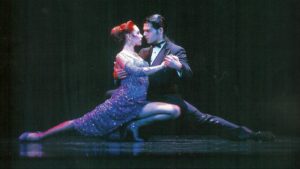
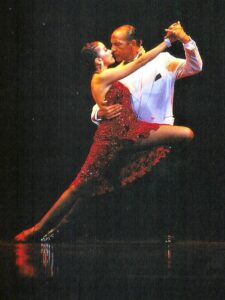 Elegance and passion, fire and ice, color and show. The tango is nose-to-nose, never-back-away, hear me now, see me now, DEAL-WITH-ME-NOW. An attitude! Ah yes, I understand. I’m back now, in my room, reflecting on the day.
Elegance and passion, fire and ice, color and show. The tango is nose-to-nose, never-back-away, hear me now, see me now, DEAL-WITH-ME-NOW. An attitude! Ah yes, I understand. I’m back now, in my room, reflecting on the day.
Meryl Streep. The strangest happening in my day was Meryl Streep. The poem, the one I wrote at Hannah Point on Christmas Day, let me explain. I read it for the contest, Manuel’s, remember? Birds and penguins, all for fun. This morning as I left the ship, I saw Manuel; he questioned “Did you leave a copy of your poem for me?” “Well no,” I answered, “but I could.” “I’ll write address for you,” he went to get a pen, came back, handed me a note. “Please send,” he said, “I want to have it, keep it,” he smiled, “I like it very much.” I asked if he had written books, “I like your style,” I said, “you taught me Penguin 505!” “Oh no,” he answered, “technical, that’s what I write.” “I’d read it if you would,” I said, a hug goodbye. A kiss! A kiss!
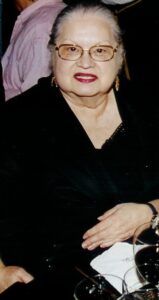 Throughout the day, it happened, time and time again. “I liked your poem very much, it was clever,” a smile, a hug, a compliment. On the plane. On all the bus-rides of the day. In the hotel. “It should be published,” Barry from Australia said. “It made me smile,” said someone I did not even know. Then at Gardel’s, sitting at the table round, Betty from Chicago leaned forward over Steak Tartare and said “I want a copy of your poem, but I want it in your voice. It was the reading that was good.” “What do you mean?” I asked, in my southern twang. Daughter Mary jumped in now, “Oh yes! You sound like Meryl Streep! Your voice so fluid and so warm.” “Meryl Streep! I’d think I sound more like Bailey White on NPR!” Mary spoke again, “No, Meryl Streep, ‘I had a farm in Af-ri-ca,’ that lilting, story-telling mood.” She looked at me. “It’s true. You make me think of Meryl Streep.”
Throughout the day, it happened, time and time again. “I liked your poem very much, it was clever,” a smile, a hug, a compliment. On the plane. On all the bus-rides of the day. In the hotel. “It should be published,” Barry from Australia said. “It made me smile,” said someone I did not even know. Then at Gardel’s, sitting at the table round, Betty from Chicago leaned forward over Steak Tartare and said “I want a copy of your poem, but I want it in your voice. It was the reading that was good.” “What do you mean?” I asked, in my southern twang. Daughter Mary jumped in now, “Oh yes! You sound like Meryl Streep! Your voice so fluid and so warm.” “Meryl Streep! I’d think I sound more like Bailey White on NPR!” Mary spoke again, “No, Meryl Streep, ‘I had a farm in Af-ri-ca,’ that lilting, story-telling mood.” She looked at me. “It’s true. You make me think of Meryl Streep.”
So that’s the scene that wound up being mine, today. This Granny may not be a Tango Babe, but Meryl Streep? That’s pretty hot, I say.
» posted on Wednesday, December 30th, 2020 by Linda Lou Burton
Southernmost Little City in the World
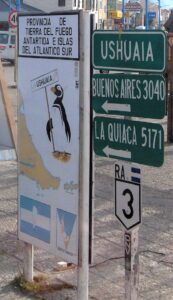 Originally posted December 30, 2005 by Linda Lou Burton from Ushuaia, Argentina – Ushuaia, you need a new press agent. I mean, you lead the list as “Southernmost City in the World,” at Latitude 53, and, you are. And you are the southernmost city in South America, (when it is pointed out that Puerto Williams is just a “settlement”) and southernmost city in Argentina, for sure. You are the “last stop” when most folks head for Antarctica, so you’re hard to miss. You have a national park in your back door and an airport big enough for the Concorde.
Originally posted December 30, 2005 by Linda Lou Burton from Ushuaia, Argentina – Ushuaia, you need a new press agent. I mean, you lead the list as “Southernmost City in the World,” at Latitude 53, and, you are. And you are the southernmost city in South America, (when it is pointed out that Puerto Williams is just a “settlement”) and southernmost city in Argentina, for sure. You are the “last stop” when most folks head for Antarctica, so you’re hard to miss. You have a national park in your back door and an airport big enough for the Concorde.
But that’s about all there is in the tour info. Your picture won’t come up on Google Earth, and, anyway, how are you PRONOUNCED? Us-who-ee-a? You-shy-uh?
I was looking forward to being there, because, for one, I’d been to Barrow, Alaska, the Northernmost City in North America, in summer there; Ushuaia completed my plan to visit the Southernmost City in South America in summer too. A tick-mark on the Accomplishment Chart. And, after 36 hours at sea, I was looking forward to walking on land again, seeing buildings, and traffic lights. All that day-in-the-life stuff. Nobody told me you’d take my breath away!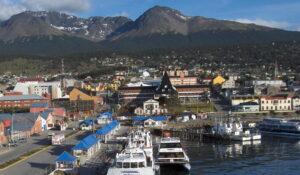
When I caught sight of you this morning I fell in love. There you sit, tucked between the clean, clear waters of the Beagle Channel and the end-of-the-Andes chain. No foothills block the views, just sea and mountains, top to bottom, bottom to top.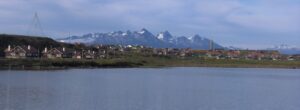
I don’t know your politics, Ushuaia, and I don’t know the quality of your restaurant food, or the comfort of your bed-pillows. Because, darn it, my one regret of the trip, I had no time to get to know you first-hand.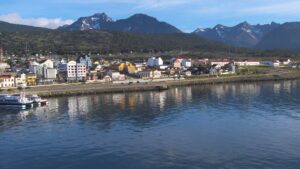
I saw you from the ship this morning, I breathed your sparkling air, and then, whoosh, onto the dreaded tour bus, zip-zip around with nary a foot on the ground, and dropped ka-plop with all my tour-buds at your airport.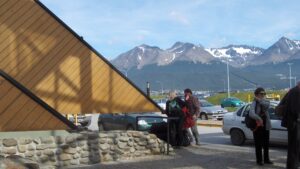
Goodbye Ushuaia, I hope to be back someday. Meanwhile, you really ought to let people know how charming you are. I, for one, will be telling.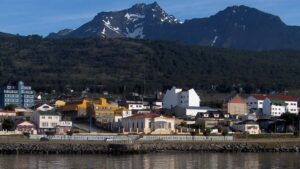
» posted on Tuesday, December 29th, 2020 by Linda Lou Burton
Antarctic Turns
Originally posted December 29, 2005 by Linda Lou Burton from Beagle Channel, Argentina – I think I know how the Pilgrims felt. All those days at sea! Never mind that I was only 36 hours out and extremely well-fed, I was still out-of-my-gourd happy to see land. Bumps on the horizon, gee, what pretty bumps. Smooth, glassy waters again. And a sunset! It wasn’t just me who was excited, cameras filled Deck 7, the open-air, out back view-spot, snapping sailboats in the sunset, watching lights of houses twinkle on the nearby shore.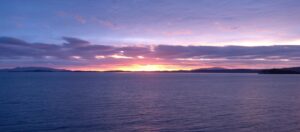
It happened just as the Captain’s Dinner ended, and our servers paraded through the room with sparklers blazing, what a sight!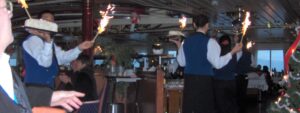
But, I’m getting ahead. Let me go back to the beginning of the day’s good mood. Manuel’s Annual Bird Drawing Contest!
14:30. We gathered in Torghatten Salong, taking over every chair, all swiveled to the front, backs to the window view for now. Manuel and Christian twittered back and forth, piles of papers, bags, creations everywhere. So many entries! The Doctor came, our designated judge. The categories were posted overhead: Ugliest Bird, Most Unusual Bird, Children’s Entries, Special Category for Which There Is No Name, Serious Drawings, Written Material. I settled in, a front-row seat.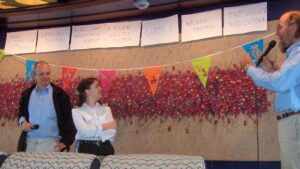
Serious drawings first. Pamela won, hands down, for her cross-stitch creation of two Adelie 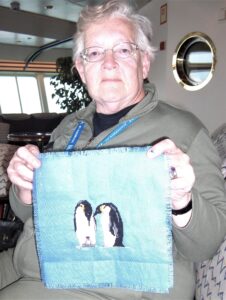 penguins, her efforts witnessed every day as she worked in her chair by the tea and cakes and the “cleanest window,” as she said. Black and white stitches on a field of blue, very pretty, well done. Manuel handed her a plastic bag of prizes. “A pen! A pin! A card! A hat!” The bag was filled with trinkets from the gift shop on the ship, except the postcard stamped special from Cape Horn, a delight. Pamela donned her Expedition Cap and grinned. “A kiss! A kiss!” Manuel bestowed his kisses too, the right cheek, and the left.
penguins, her efforts witnessed every day as she worked in her chair by the tea and cakes and the “cleanest window,” as she said. Black and white stitches on a field of blue, very pretty, well done. Manuel handed her a plastic bag of prizes. “A pen! A pin! A card! A hat!” The bag was filled with trinkets from the gift shop on the ship, except the postcard stamped special from Cape Horn, a delight. Pamela donned her Expedition Cap and grinned. “A kiss! A kiss!” Manuel bestowed his kisses too, the right cheek, and the left.
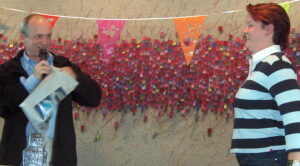 I snapped the camera at the action. My tablemate had won! Doug, the artist, won too, a watercolor of the albatross monument at the Cape. The fun continued, category by category. The children were presented, each with their drawings and construction-paper birds. Each was applauded, praised. Everyone beamed. Will and Paul and Annmarie, the grown-up siblings from the Netherlands on the trip with their parents, who were celebrating a 50th Anniversary, each had entered; each won. Proud Papa and Mama!
I snapped the camera at the action. My tablemate had won! Doug, the artist, won too, a watercolor of the albatross monument at the Cape. The fun continued, category by category. The children were presented, each with their drawings and construction-paper birds. Each was applauded, praised. Everyone beamed. Will and Paul and Annmarie, the grown-up siblings from the Netherlands on the trip with their parents, who were celebrating a 50th Anniversary, each had entered; each won. Proud Papa and Mama!
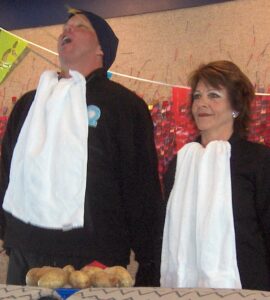 There was gentle comedy, and comedy to bust-a-gut. A simple sheet of paper, the word ANTARCTIC across the top in big-block letters. Manuel held the paper high, then turned it around. “Antarctic terns,” he said, straight-faced. A roll of toilet paper, signed by all the guests, bird drawings by each name. A skit, starring Polly Penguin from Perth. Manuel had assured us, in lecture after lecture, that “pebbles are better than diamonds!” in the penguin world. Not so with Polly. Good-guy penguins and rogue-eye penguins brought her pebbles (although the skit-props were large baking potatoes borrowed from the ship’s kitchen) but fickle Polly turned them all away in favor of a gift of DIAMONDS from the Captain!
There was gentle comedy, and comedy to bust-a-gut. A simple sheet of paper, the word ANTARCTIC across the top in big-block letters. Manuel held the paper high, then turned it around. “Antarctic terns,” he said, straight-faced. A roll of toilet paper, signed by all the guests, bird drawings by each name. A skit, starring Polly Penguin from Perth. Manuel had assured us, in lecture after lecture, that “pebbles are better than diamonds!” in the penguin world. Not so with Polly. Good-guy penguins and rogue-eye penguins brought her pebbles (although the skit-props were large baking potatoes borrowed from the ship’s kitchen) but fickle Polly turned them all away in favor of a gift of DIAMONDS from the Captain!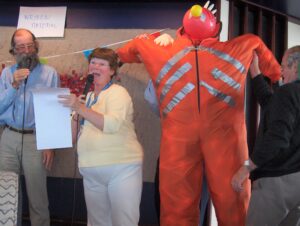
The Captain entered a coat-hanger albatross (and won); the group of Aussies entered a “rare 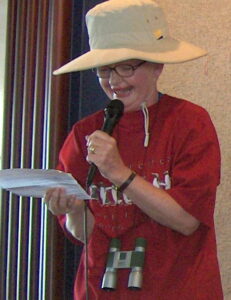 bird” — an orange survival suit stuffed with balls from the kiddie playroom. And finally, the Written Material category. Short poems, serious poems, thoughtful essays, each read, proudly, by each author.
bird” — an orange survival suit stuffed with balls from the kiddie playroom. And finally, the Written Material category. Short poems, serious poems, thoughtful essays, each read, proudly, by each author.
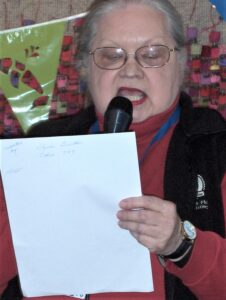 Then at the last, “Please come and read your poem,” Manuel said. Christian handed me the mike. “Twas the night before Christmas,” I began, surveying my packed-house audience. “And all through the ship….” The story worked, it seemed. Laughter when I hoped for laughter; murmurs when I hoped for surprise; and, at the end, applause, a prize. A Pen! A Pin! A kiss! A kiss! What fun!
Then at the last, “Please come and read your poem,” Manuel said. Christian handed me the mike. “Twas the night before Christmas,” I began, surveying my packed-house audience. “And all through the ship….” The story worked, it seemed. Laughter when I hoped for laughter; murmurs when I hoped for surprise; and, at the end, applause, a prize. A Pen! A Pin! A kiss! A kiss! What fun!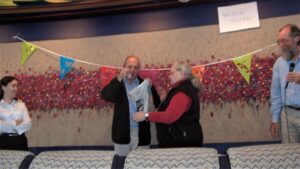
19:00. I’m dressed in dangly earrings for the Captain’s do. He’s standing at the door, smiling, handshaking, the perfect host. The servers offered wine, the tables were set. My last night with my tablemates. Pamela and John, from England. Ross, from Nacogdoches, Texas. The mood is festive, yet tinged with sad. The trip is almost over. We’re bonded now, how many people have done what we have done? We have been to Antarctica, one of the most inaccessible places on earth. Now it is ours, forever in our hearts and minds.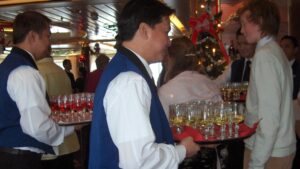
And we are turning home.
» posted on Tuesday, December 29th, 2020 by Linda Lou Burton
Purple Ribbons for the Countdown
Originally posted December 29, 2005 by Linda Lou Burton from Drake Passage, Argentina – Last day on the ship! Here’s the sedge-ool, we’ve been told.
- 1000 Pick up your colored ribbons. Purple for flight #1, red for #2. Attach to luggage, put luggage outside cabin door by 2200 hours.
- 1100 Alan Parker lecture: The Antarctic Treaty and the Future of Antarctica, Kapp Horn Hall.
- 1200 Lunch buffet.
- 1430 Manuel’s Annual Bird Drawing Contest (multi-lingual all ages) in Torghatten Salong – Prizes! Prizes! (will my poem win?)
- 1630 Special Charity Auction to raise money for Antarctic research. For bidding – Expedition Jackets and the Captain’s Master Voyage Chart!
- 1900 Captain’s Dinner.
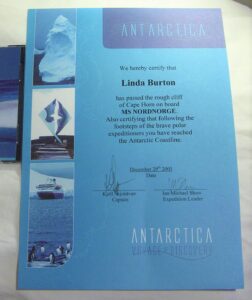 And then, early to bed. Breakfast tomorrow at 6, depart the ship by 8. Get off in Ushuaia, southernmost city in the world. I have purple ribbons I need to tie on the fancy-schmancy luggage, after I try to stuff everything back in, that is. Have I accumulated much?
And then, early to bed. Breakfast tomorrow at 6, depart the ship by 8. Get off in Ushuaia, southernmost city in the world. I have purple ribbons I need to tie on the fancy-schmancy luggage, after I try to stuff everything back in, that is. Have I accumulated much?
I bought a wooden sheep at Estancia Fitz Roy, a tiny thing; just now I bought three watercolors from Doug. He’d painted Evie, the penguin I met at Admiralty Bay. And my certificate that I’d rounded the Horn, and reached the continent of Antarctica, a real prize!
I need to settle the bill, I need to calculate the tip. The sun is shining now, we’re riding north, Atlantic on the right, Pacific on the left. South America dead ahead.
This time tomorrow, I’ll be in Argentina. Solid ground, no more rock and roll.
» posted on Monday, December 28th, 2020 by Linda Lou Burton
Beam me up, Scotty
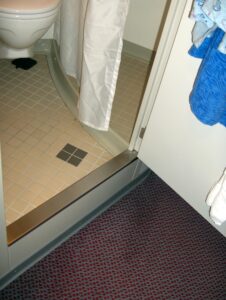 Originally posted December 28, 2005 by Linda Lou Burton from Drake Passage, Antarctica – The rolling woke me up at 3 AM. The sun outside revealed the waves. Waves, and nothing but. I reached for the wristbands, pulled the covers up. I woke at 5, and then again at 7. The ship was rolling, swaying, natural for open waters, not natural for a land-lubber like me. At 8 I’m up, I showered leaning in the corner of the stall.
Originally posted December 28, 2005 by Linda Lou Burton from Drake Passage, Antarctica – The rolling woke me up at 3 AM. The sun outside revealed the waves. Waves, and nothing but. I reached for the wristbands, pulled the covers up. I woke at 5, and then again at 7. The ship was rolling, swaying, natural for open waters, not natural for a land-lubber like me. At 8 I’m up, I showered leaning in the corner of the stall.
Waffles in the dining room, I made it, hand to hand and rail to rail. The waffles smelled so good, but I did not think I could make it to the plates. “I will bring it to you, Madame,” said the waffle maker, “would you like syrup?” I sat down, gratefully. The coffee sloshed in my cup. Would my glass of water tilt? I held it with one hand, fork in the other, ate.
“Hell Served for Breakfast: Tales of the Aurora” was the lecture for the morning. Our leader Ian was to tell the tale, in Torghatten Salong. I went, sank into a seat close to the door. Ian lifted the mike, surveyed the green-faced crowd, chuckled wickedly. “One of you will leave,” he said. “I guarantee it. At least one of you will have to leave.” The tale began, explorers, hardship, winter winds, disaster. “The dogs were starving, the men were too. Wild loaded all the good supplies on one sled, pulled by six strong dogs; the weaker dogs were hitched to less important things.” Which sled went over the crevasse?
The good one of course (guess Wild had never heard of Aesop’s basket of eggs, eh?). The men were left with no food, six starving dogs. One dog died that night, they cut him into pieces. The dog was tough, the men could hardly chew. They boiled the feet, made a gel of doggie paw. They ate the liver.
“I’ll be your first to go,” a lady near the front stood up, and left. Ian chuckled, continued. “The men were sick. Their skin fell off. Their mustaches fell off. They lost the soles of their feet. They were coming apart. Wild taped the soles of his feet back on, crawled miles and miles on hands and knees.” An aside here: Ian explained that sled dogs store high amounts of Vitamin A in their liver, toxic to humans. It was the doggie liver that made the men ill, not the doggie-paw gel. Good to know.
Ian ended his tales of heroic explorers with a poem about “fighting to the end, never quitting.” I had made it to the end. I am heroic, I thought, as I bumped into the wall, slung myself towards the door, grabbed a post. Betty, waiting by the elevator, put out her hand for me. I made it to my room, and slept.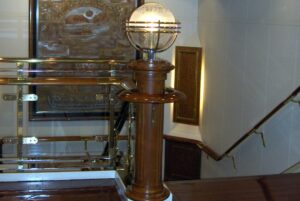
A bite of lunch before they closed the doors at 2. I wanted to hear the lectures, divert my mind. Manuel would tell us more about penguins today. Name and Naming was the title of his talk. Hand to hand and chair to chair, I made it to the front of the room.
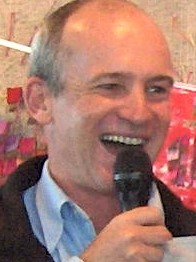 On the board Manuel had written: Pen-gwyn, Pin-wing, Pinguis. “Welcome to Penguin 505,” he said. “Today we will talk about how penguin was name.” He pranced side to side, ready to challenge us. “Who can tell the first OCCIDENTAL man who saw the penguin?” he asked, looking at our faces, who would know?
On the board Manuel had written: Pen-gwyn, Pin-wing, Pinguis. “Welcome to Penguin 505,” he said. “Today we will talk about how penguin was name.” He pranced side to side, ready to challenge us. “Who can tell the first OCCIDENTAL man who saw the penguin?” he asked, looking at our faces, who would know?
I was sure I had the answer. “Magellan!” I said proudly. “You go to the water!” he shouted. “No!”
“Drake?” said someone else, “Darwin,” said another. “Oh! You go to the ice! Wrong you are wrong! Oh! No one knows!” he shook his head. We were bewildered, out of names.
“Columbus?” quietly said. Manuel rolled his eyes. “Columbus? He went to tropics, not to cold waters!” “Vikings, then?” I tried again. Manuel did not like that answer either.
“You are thinking the wrong place,” he told us. “It was South Africa! Vasco da Gama!” Strutting proudly, he knew he’d fooled us all.
“Now, who was first Occidental man to see penguin in South America?” he challenged again. I was quiet, this time. No one else answered, either. In disgust he told us, “Magellan! You know your history! Magallenic penguins I have told you before!”
“I was afraid to say it again!” I said. Manuel patted the top of my head. “Magellan, now you know.” Now I know. I think I passed Penguin 505.
But I have not passed Seaworthy 101. I went back to my room, and slept again. Tonight, no dinner for me.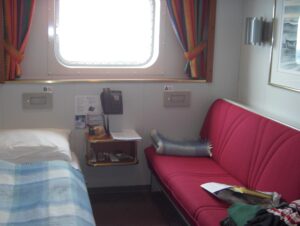
A quote on our handout attributed to Deborah Harler says it all: If 70% of the earth’s surface is covered by water, how come so much of it seems to be between the Antarctic Peninsula and the Beagle Channel?
Beam me up, Scotty.
» posted on Sunday, December 27th, 2020 by Linda Lou Burton
Neither rain, nor sleet, nor blowing snow…
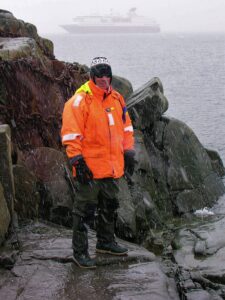 Originally posted by Linda Lou Burton December 27, 2005 from Port Lockroy, Goudier Island and Neko Harbour, Andvord Bay, Antarctica – Today was a little bit boring, actually. Well, except for Mother Nature and her whims. She kept our leader on his toes! The sun was hidden by low clouds and blowing snow for our breakfast view, but the winds were not too strong for a landing at Port Lockroy.
Originally posted by Linda Lou Burton December 27, 2005 from Port Lockroy, Goudier Island and Neko Harbour, Andvord Bay, Antarctica – Today was a little bit boring, actually. Well, except for Mother Nature and her whims. She kept our leader on his toes! The sun was hidden by low clouds and blowing snow for our breakfast view, but the winds were not too strong for a landing at Port Lockroy.
“Group 3 proceed to the Departure Deck,” was the first announcement. I could see a tiny building perched on the rock ahead, Base A, the handout said, on Goudier Island. The building housed a museum and post office, managed by Antarctic Heritage Trust as a historical site. I’d already handed over the 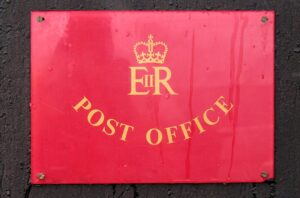 postcards I wanted to mail, our Purser would make sure to deliver them for the precious stamp “Antarctica.” Nine postcards for me, $2.00 each. From the ship a total of 1,800 postcards were presented – a good day for the southernmost post office in the world! No automation there; hand canceled, each. Expect them to be delivered by Eastertime, we were told.
postcards I wanted to mail, our Purser would make sure to deliver them for the precious stamp “Antarctica.” Nine postcards for me, $2.00 each. From the ship a total of 1,800 postcards were presented – a good day for the southernmost post office in the world! No automation there; hand canceled, each. Expect them to be delivered by Eastertime, we were told.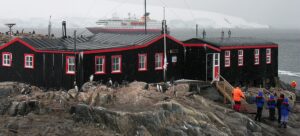
I watched the PolarCirkels back and forth, snow flurrying around, but most folks, like me, settled with their books, and cameras, content to stay aboard. It was good our group was small, Goudier Island is very tiny and half of it is off limits as a Site of Special Scientific Interest (SSSI). Too many tourists! There is a study now to see how visitors affect the nesting penguins. On one side tourists are allowed, the other, no.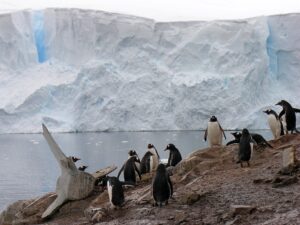
Another announcement. “If you please to use your credit card in the gift shop on shore, you will buy the minimum of $100. Otherwise take cash.” I thought of Christmas sales back home. Shopping! Not for me. Soon everyone was back, and lunch was served.
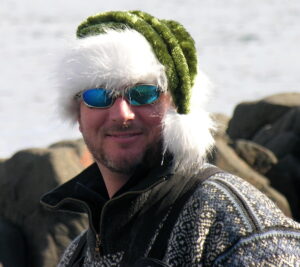 Our leader Ian had raved about LeMaire Channel for days. He put this on our handout for 14:30 today, our approximate arrival time: First sighted by Dallman in 1873 and then charted and traversed in 1898 by Adrien de Gerlache who named it for Charles LeMaire, a fellow Belgian who explored the Congo. (?? My thought – what has that to do?) The steep cliffs and glaciers of Booth Island to one side mirror the opposite shores of the Antarctic Peninsula. So much film is exposed in the area of the LeMaire that it is known by expedition staff as “Kodak Crack” or “Fujifilm Gap.”
Our leader Ian had raved about LeMaire Channel for days. He put this on our handout for 14:30 today, our approximate arrival time: First sighted by Dallman in 1873 and then charted and traversed in 1898 by Adrien de Gerlache who named it for Charles LeMaire, a fellow Belgian who explored the Congo. (?? My thought – what has that to do?) The steep cliffs and glaciers of Booth Island to one side mirror the opposite shores of the Antarctic Peninsula. So much film is exposed in the area of the LeMaire that it is known by expedition staff as “Kodak Crack” or “Fujifilm Gap.”
In my Lonely Planet book is this: This steep-sided channel – just 1,600 mm wide – runs for 11 km between the mountains of Booth Island and the Peninsula. The passageway is only visible once you’re nearly inside. Unfortunately, ice sometimes blocks the way, so ships may be forced to retreat and sail around Booth Island. At the northern end of the channel are two tall, rounded, and often snowcapped peaks at Cape Renard.
What do you think happened to us today? What? What? On this day of blowing snow and fog? Aha! You guessed! Mother Nature sent Ian scurrying back to his planning board. ICE BLOCKED OUR WAY! We could not enter LeMaire Channel.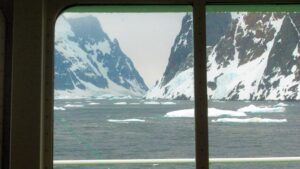
I think this was our most excitement yet. Everyone gathered in Torghatten Salong as we approached, cameras in hand. We ran to one side, then the other, as icebergs scraped against the ship with crunching noise. Closer, closer, but plain to see. Ice everywhere ahead. Announcement. “Ladies and Gentlemen, we must turn the ship around.” Slowly we began to spin, floating in a pot of iceberg soup. The cameras clicked.
“We’ll go instead to Andvord Bay,” Ian announced, ten minutes later, “we’ll stop in Neko Harbour, an incredibly beautiful spot.” The pepping up, all part of the job. No disappointment, just a switch. Plan B.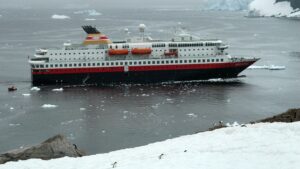
At 5 PM (excuse me, 17:00) the PolarCirkels were ready, the Hardy Bunch began to go ashore. I watched from my warm spot, a funny sight. Through the camera zoom I saw a procession of blue on the snow, walking up the hill; and right beside, a shorter procession of black and white. Big human arms swinging back and forth, little penguin arms flapping, what a sight. It made me laugh.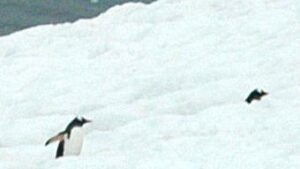
The blue boobies (sorry, I think that would be the Galapagos), the blue PROCESSION in their Voyage of Discovery Antarctica jackets climbed to the top of the snow mountain, looked like little ants, plodding to the top, then rolling down, tumbling over in the snow. The penguins, meanwhile, kept feeding chicks, an ordinary day.
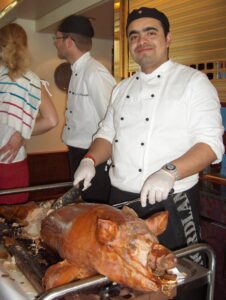 Dinnertime for us. Filipino night, in honor of our housekeeping crew. Lumpia! Pancit! Chicken with pineapple (they called it sweet and sour); exquisite flan. I am very happy and I eat too much. Bedtime and I’m stuffed.
Dinnertime for us. Filipino night, in honor of our housekeeping crew. Lumpia! Pancit! Chicken with pineapple (they called it sweet and sour); exquisite flan. I am very happy and I eat too much. Bedtime and I’m stuffed.
Announcement on the intercom: Four whales are swimming on Port Side, if you want to come and see. I threw on sweatpants, sweater, slung the door-card around my neck, both cameras in my hand, no shoes, just socks. Please believe, I saw the whales. Thirty minutes of video, you see the waves, a spout of water, a gentle rise, the flip of tail, the whale is gone. A whale’s lung capacity is large, very large. They do not come up again for many, many minutes. No use, I thought, to try the still camera, I’d never get the timing right. Pamela watched, tried, John had his nose pressed against the window, we waited, another sighting, gone again.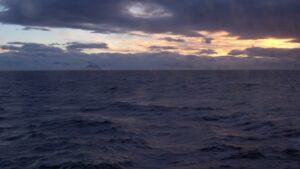
I live near whales! One day I’ll take the charter boat and see the Orcas, Puget Sound. But now I’m in Gerlache Strait, with whales and icebergs floating by.
Did I say this was a boring day?
» posted on Saturday, December 26th, 2020 by Linda Lou Burton
Glissading in Paradise
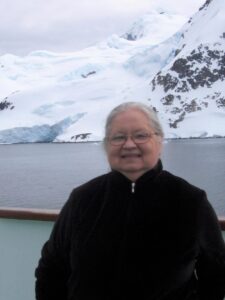 Originally posted December 26, 2005 by Linda Lou Burton from Culverville Island, Paradise Harbor Mainland, Leith Cove, Antarctica – Today, I had to recharge both camera batteries in the middle of the day. A first! But think of this. Think of a day that will still make you smile when you are very old, when you are very gray. Today was one of those.
Originally posted December 26, 2005 by Linda Lou Burton from Culverville Island, Paradise Harbor Mainland, Leith Cove, Antarctica – Today, I had to recharge both camera batteries in the middle of the day. A first! But think of this. Think of a day that will still make you smile when you are very old, when you are very gray. Today was one of those.
Last night’s voyage was rock and roll, a bunk-ride, according to the slang. Today, in the Errera Channel between Ronge Island and the Arctowski Peninsula, the waters were as calm as glass, the sun was breaking through. I rushed out to the upper deck, the fresh air, my sweater warm enough. Pamela and John were there already, smiling, snapping pictures, running from one side of the ship to the other. We swapped cameras for a pose. Let’s prove that we were there! Mountains behind, too picturesque for words. Mountains around, white glass, glaciers, icebergs floating everywhere. A landing there, then lunch, the ship moved on.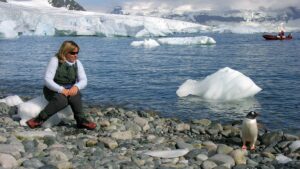
In the middle of dessert, we rounded Waterboat Point. Oh my! Forget dessert! Grab the cameras, head for the deck! Paradise Harbour. “Aptly named,” our handout warned. Aptly named, indeed! Ahead, a cluster of red buildings against the snowbanks; it’s Almirante Brown, a now unmanned Argentine base. Unmanned, that is, except for penguins, uniformed in black and white, pacing back and forth, flapping to the ship. “Come in!”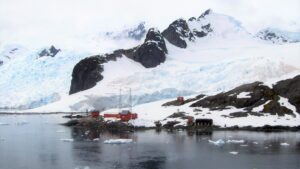
The afternoon turned out to be the best yet of the trip. The PolarCirkels hurried back and forth, one group to shore, another back. Special arrangements for Jan, her cane and walker 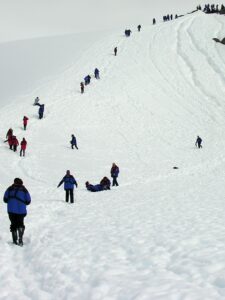 placed aboard a boat on deck, then gently lowered to the water, no steps! The steep hill above the base was lined with those ambitious for a climb; reward a smooth glissade back to the bottom on the snow. “No, some rocks!” Bjoern reported back to me. “I hit some rocks.” Paul was prepared. “I stuffed my pants with sweaters,” he laughed, “to protect my bum.” They are young, and full of energy. The older crowd stayed at the bottom, walking in the snow. Pamela lost her boot. “Someone had to pull it out of the snow for me,” she said. “Someone had to pull ME out,” Ross laughed. “I walked to where the children were making a snowman and sunk, three feet down.”
placed aboard a boat on deck, then gently lowered to the water, no steps! The steep hill above the base was lined with those ambitious for a climb; reward a smooth glissade back to the bottom on the snow. “No, some rocks!” Bjoern reported back to me. “I hit some rocks.” Paul was prepared. “I stuffed my pants with sweaters,” he laughed, “to protect my bum.” They are young, and full of energy. The older crowd stayed at the bottom, walking in the snow. Pamela lost her boot. “Someone had to pull it out of the snow for me,” she said. “Someone had to pull ME out,” Ross laughed. “I walked to where the children were making a snowman and sunk, three feet down.”
Ah, summer in Antarctica. The sun kept shining.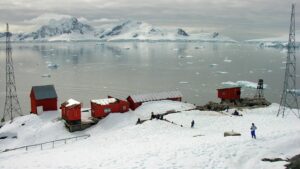
Everybody back on board, move on. Announcement: we will anchor overnight at Leith Cove. Dinner over, took my book and cameras to Torghatten Salong, the observation deck, window views wide-angled. Sat down. The water reminded me of a toy, a mirror for a lake, it was so smooth. The mountains turned to doubles, the mountain up, reflection down. Pink clouds, blue icebergs, a thunder crash as pieces fell.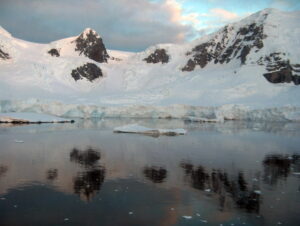
A seal slumbered on a floating chunk. The sun did not set at all. At midnight I forced myself to go to bed.